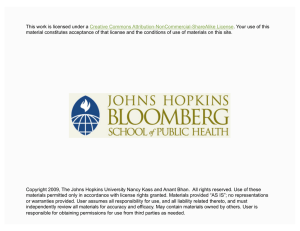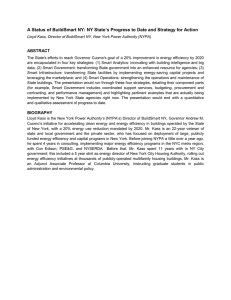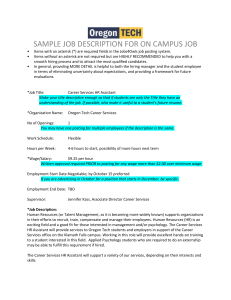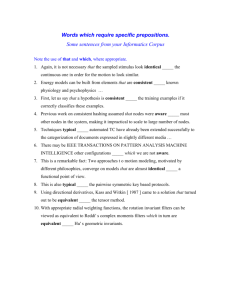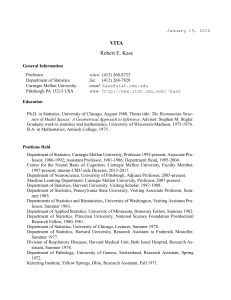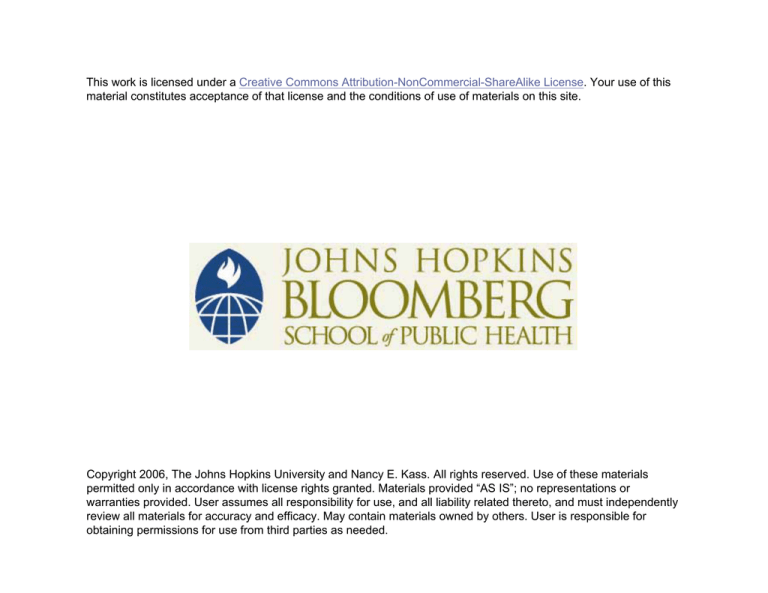
This work is licensed under a Creative Commons Attribution-NonCommercial-ShareAlike License. Your use of this
material constitutes acceptance of that license and the conditions of use of materials on this site.
Copyright 2006, The Johns Hopkins University and Nancy E. Kass. All rights reserved. Use of these materials
permitted only in accordance with license rights granted. Materials provided “AS IS”; no representations or
warranties provided. User assumes all responsibility for use, and all liability related thereto, and must independently
review all materials for accuracy and efficacy. May contain materials owned by others. User is responsible for
obtaining permissions for use from third parties as needed.
Justice in Research Ethics:
International Issues
Nancy E. Kass, ScD
Johns Hopkins University
Nancy Kass, ScD
Professor
Phoebe R. Berman
Professor of Bioethics
and Public Health
JHSPH Department of
Health Policy and
Management
3
Section A
Justice and International
Research: Research Issues
Distributive Justice
Fair distribution of benefits and burdens
Whereas beneficence asks us to balance
benefits and burdens overall, justice asks us
to balance benefits and burdens to the study
community
Photo by Nancy Kass
5
Issues: Benefit vs. Exploitation
Why is research conducted there?
What scientific/research/ethical capacity
already exists? What capacity of
strengthening will occur?
What is the likelihood of future access to
successful interventions?
What is the likelihood of sustained access to
non-intervention research benefits?
6
Why Is Research Proposed in the
Lesser-Developed Community
Scientific/public health justification?
That country requested it?
Convenience/familiarity: Pre-existing
relationship
Greater prevalence
Question or intervention only relevant to
their type of health problems
7
Is It Ethically Acceptable
to Conduct Research There?
How consistent with that country’s research
agenda?
Must be favorable benefit:harm ratio for that
community
Research must be relevant to their problems
Other less vulnerable community?
Cost/expediency relevant but not decisive
8
Types of Research Partnerships
Postal research: Send
samples back
Parachute research:
Drop in and collect
samples; bring back
Annexed sites:
Expatriate staff direct
local, newly developed
field sites
Partnership
Source: (Costello and Zumla, BMJ)
9
Characteristics of Research
Partnerships
Local academics manage sites
Expatriate academics visit regularly to
provide advice/technical support
Expatriate junior research fellows work in
country with local counterparts, under
supervision of local academics
10
Cooperative Partnership Relies
On
Mutual trust
National ownership
Emphasis on getting findings into policy and
practice
Development of national research capacity
11
Kass/Dawson findings
98% of local researchers are involved in
subject recruitment
87% are involved in conception of initial
study design
69% are involved in data analysis
53% are involved in grant writing
12
Justice Requires Benefit to Study
Population/Host Country
Must have access to fruits of research;
otherwise, it would be exploitation
How clear a plan is required?
– Concrete plans?
– Findings will fuel ability to advocate?
13
What Increases Likelihood
of Exploitation? (UNAIDS)
Less experience with scientific research
Less local infrastructure for health care and
treatment
Less ability to give voluntary informed
consent, due to social, gender, class
inequities
Continued
14
What Increases Likelihood
of Exploitation? (UNAIDS)
Less experience or capacity with scientific
and/or ethical review
Less infrastructure to conduct own research
15
Section B
Justice and International Research:
Collaboration, Capacity Building, and
What Is Owed to Study Communities
CIOMS Guidance About Justice
Must be responsive to health needs of host
country
Disease is an important problem in host
country
Agree in advance that products will be made
reasonably available afterward
Continued
17
CIOMS Guidance About Justice
Develop capacity to carry out similar projects
independently, including ethical review
Obligations clarified in advance
18
Responsive to Health Needs and
Priorities of Host Communities
Reason for choosing site should be explicit
Should not exhaust resources that
community “usually devotes to the health
care of its members”
19
Prior Agreements About Future
Access
If any product is developed, there must be
an understanding before research is begun
Sponsoring agency should ensure reasonable
availability
Must discuss availability of other (nonintervention) services
20
Kass/Dawson Study Findings
67% of U.S. investigators said intervention
was or would be provided
53% said research should not be carried out
unless intervention, if successful, would be
made available
– 46% of those conducting intervention
study agreed with this statement
21
Researchers’ Views
“Simply put, the benefits of research
conducted in developing countries should
also be made available to developing
countries at affordable rates as soon as
those benefits become apparent”
Continued
22
Researchers’ Views
“The issue of what medical care to provide after
the study is a thorny one; research can lead to
suggested improvements in medical care, but
the funding of such improvements, and building
of the management skills required to implement
them, cannot be the focus of the research. This
requirement would mean that chronic illnesses
could not be researched, since no funding
agency would agree to fund the treatment
indefinitely”
23
Capacity development
“An important secondary objective” is
capacity development to carry out similar
projects independently
Expected to employ and train local
individuals to fulfill most roles
Should provide facilities and personnel to
make health care services available to
population from which subjects are recruited
24
Kass/Dawson Findings
98% of studies will leave trained personnel
90% leave medical/office/lab equipment
50% leave buildings, lab facilities
43% left power equipment or improved
water system or cars
25
Obligations of Sponsors
Expected to ensure research subjects and
communities are not made worse off
Expected to provide money to develop
capacity for independent ethics review
Obligations will vary with circumstances of
studies: Clarify in advance
26
Glantz, Annas, Grodin, Mariner: Hastings
Center Report 28 (1998): 38–42
“Research is a means to solving problems, not an end
in itself. The goal must be to create interventions that
will benefit the people of the countries in which the
research is conducted. They will benefit only if the
knowledge gained produces interventions that are
affordable and accessible. This needs to be determined
as a condition of approval before research is conducted
so that limited research funds are not wasted, and
research subjects are not drawn from populations that
will not be able to benefit from the research.” (p. 42)
27
Justice Challenges
How consistent with national priorities does study
need to be?
Whose responsibility are dissemination and
implementation?
What if a study is beneficial to individual
participants, but there are no guarantees of future
access?
What if a study builds capacity, but the benefits
provided are not related to the study question?
28


